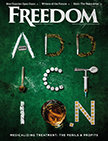Vol. 47, Issue 3 ‣ profile
Advocate for Label & Drug Free Education Sheila Matthews

We’ve all seen a child waiting in a doctor’s office, at an airport, or in a restaurant, who can’t seem to sit still. They seem agitated, frustrated—and may even act in a way you deem inappropriate.
Is something wrong with the kid? Who would know better—his mother, or a school?
That’s the quandary Sheila Matthews faced when officials at her son’s New Canaan, Connecticut, elementary school labeled him disruptive. Joe, a second grader, talked in class, seemed bored, and pushed back at things he didn’t like. Joe wasn’t fond of the school’s bus driver, for example, and so he circulated a petition calling for the driver’s dismissal—an enterprising and creative move in the eyes of his mother. The school saw it as obstreperous troublemaking.
“The first day I sent him to school by himself, he was so excited,” she says. “By second grade, his spirit was being crushed.”
Eventually, school officials sent Matthews a packet of information they wanted her to look over in preparation for a meeting they had called to discuss her son’s “issues.” It included an ADHD checklist. Matthews, who always thought Joe was gifted, had never heard of the condition. She started filling out the checklist, answering “yes” to a lot of the questions.
Matthews Googled “ADHD,” and saw that her answers pointed to Attention Deficit Hyperactivity Disorder. “It said it was a mental illness,” she recalls.
Then she Googled “gifted children” … and found it just as likely a diagnosis for her son.
And then she cried.
Looking for an escape, Matthews turned on the television and settled on C-Span, which was airing the congressional testimony of Patricia Weathers, an activist opposed to the use of antipsychotic drugs on children. In her account, Weathers recalled filling out a profile for her son—one similar to the ADHD checklist Matthews had received—and having her hand forced to medicate him so that he could remain in public school. She also spoke to the adverse effect the drugs had on her son.
When Weathers’ testimony was over, Matthews turned off the TV and cried some more. “I’m somebody who really believes that things line up for a reason,” Matthews says. “I saw the look on Patricia’s face and I had that same feeling—alone, scared and vulnerable.”
Subsequently, Matthews tracked down contact information for Weathers and got her on the phone. “I introduced myself. I was shaking,” Matthews recalls. “I said, ‘I saw you. I know how you feel. And I’m heading toward a meeting where I think the school is going to tell me my son has ADHD.’
“She suggested I tell them that I don’t believe in ADHD.”
The next day, Matthews and her husband met with Joe’s teacher, the principal and the school psychologist. “They said based on their observations, they believed my son had ADHD. They presented their case. The psychologist handed me a packet of pro-drug material,” she says.
“They said, ‘We have nothing else to offer your son at this time.’ I wanted support. I was clearly upset.”
Matthews soon spoke with Weathers again. “I had never met her, but we vowed together on the phone that we would do everything possible to warn other parents” of this type of “ambush,” says Matthews.
Together, they formed AbleChild, intended to “inform, support and unite” all concerned with child drugging and the subjective psychiatric labeling of American schoolchildren. The nonprofit also advocates for better adverse-reaction reporting and labeling on all prescription drugs. Now nearly 15 years later, AbleChild is headquartered online at AbleChild.org, with founders Matthews based in Connecticut, and Weathers in Millbrook, New York.
Since its founding in 2001, AbleChild has set out to find all the information it can on the adverse effects of the psychiatric drugs schools encourage parents and caregivers to administer. Recently, its work led to two antidepressant drugs, Paxil and Effexor, being banned from use in Connecticut foster homes pending a review of their effects. “We have a national presence because of our work getting these drugs banned,” says Matthews. (AbleChild has been featured in Time magazine, The New York Times, on Fox News and on talk shows.)
“But we’re still a truly grass roots organization.”

AbleChild’s greatest accomplishment, says Matthews, “is our work on mandatory medication prohibition. You are not mandated to place your child on psychiatric drugs in order to attend public school [in Connecticut].”
“I don’t think the schools should be agents for the drug companies—pushing and peddling drugs off a checklist,” she adds.
Currently, AbleChild is working on a Connecticut state bill that would require pharmacies to put the 1-800-MedWatch phone number on all prescription labels. MedWatch is an FDA program that reviews reports of adverse effects of all drugs, and regulates drug companies based on their findings. According to Matthews, the FDA only hears from one percent of consumers that have adverse reactions—which range from nausea to suicidal thoughts. Part of the reason, she believes, is because so few people know what MedWatch is, or how to make a report to them.
Matthews adds that 300 people a day die from adverse drug reactions, and the Centers for Disease Control reports that adverse effects cause over 700,000 emergency room visits a year. But the MedWatch bill is receiving push-back from pharmacists, who say prescription labels are too small to add additional information—and that the MedWatch number is usually on the receipt or other papers that accompany prescriptions. Matthews hopes to get the bill passed in the state, and eventually at the federal level.
AbleChild has also called for the release of medical records pertaining to suspects of school shootings. Matthews spent two years working to get records released after the Sandy Hook Elementary School shooting in Newtown, Connecticut. Recent reports suggest that the shooter had been treated with an antidepressant and suffered adverse reactions.
To gain support for the cause, Matthews organized an effort in her hometown to gather signatures on a related petition (which she says 95 percent of the people she encountered signed). At one point, Matthews says local authorities tried to stop the small group.
She pointed out to police that the signature-gatherers weren’t causing a disturbance. Then she wrote the name of her cousin, James Comey, on the back of her business card and gave it to the police. “Then they left us alone,” she laughs.
Comey is the director of the Federal Bureau of Investigation.
Asked if petition-writing is something that runs in the family, and recalling her young son’s petition against the bus driver, Matthews laughs. “I hadn’t made that connection yet.”
Matthews never did medicate her son, but instead sought outside academic support. Joe graduated Bowling Green University—early—and works in marketing in New York.





























